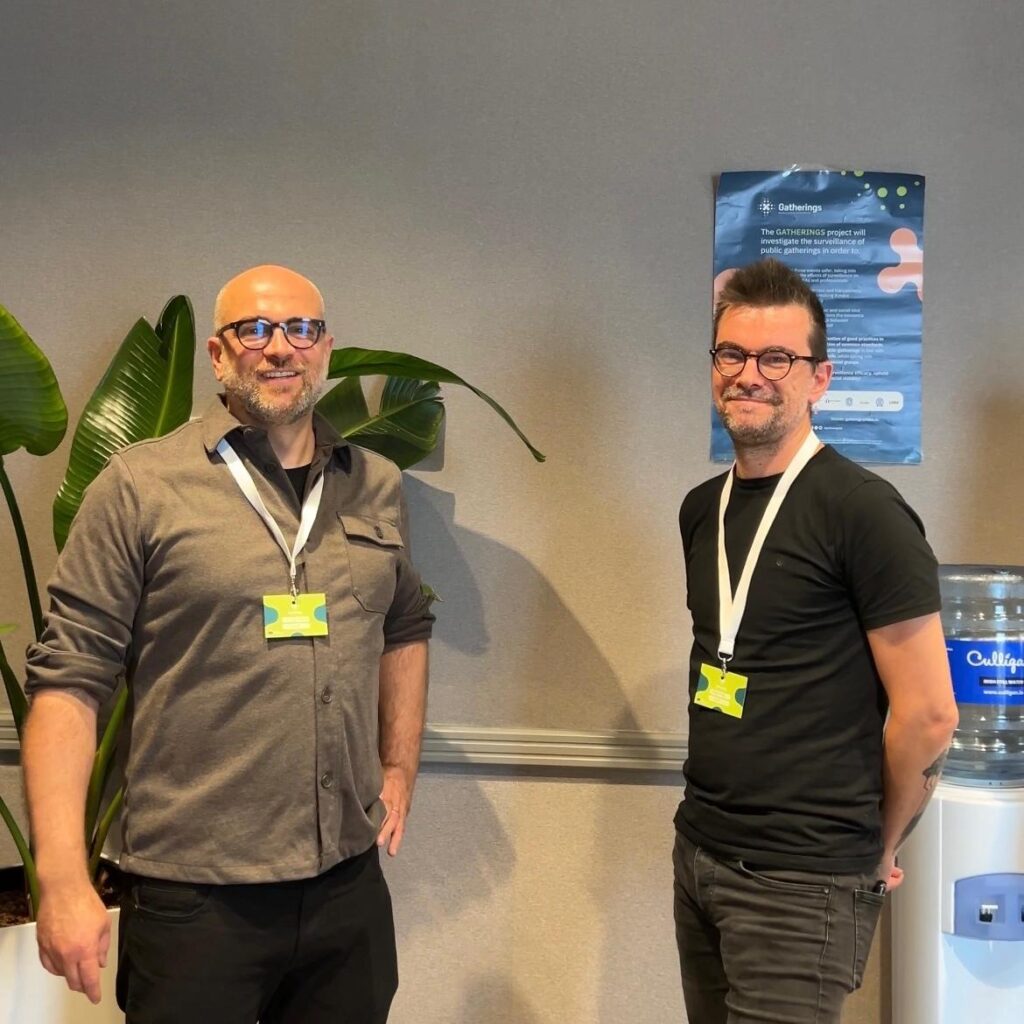The GATHERINGS project aims to find methodologies that will help organisers of large-scale events and law enforcement agencies sustain a balance between security, privacy and cost in public gatherings. Throughout the next 3 years, our Consortium will collaborate with key stakeholders to understand their needs and experiences and ensure they are reflected in the project outputs. Find out how the GATHERINGS coordinators, Lucas Melgaço and Mattias De Backer from Vrije Universiteit Brussel (VUB), are working to achieve the GATHERINGS goals in the interview below.
What would you say is the main objective of the GATHERINGS project?
Lucas Melgaço – The main objective of the GATHERINGS project is to think about how to set up surveillance technologies and assemblages to securitise public gatherings, while weighing their effects in terms of privacy and data collection, and while taking into account the social impact of such technologies and the economic cost. This is both an invitation to reflect on such a balancing exercise, as well as a commitment to formulate common standards for surveillance practices EU-wide.
Some of our key target groups are Law Enforcement Agencies, as well as Surveillance Professionals. What would you say are the main assets and takeaways the project will be able to provide them with? How will GATHERINGS help these target groups?
Mattias De Backer – The project has roughly three main outputs for these stakeholders. Firstly, we will formulate a set of common standards for the surveillance of public gatherings. Secondly, we will develop an accessible and easy-to-use matrix that allows such professionals to weigh security against privacy, social impact and economic cost. Thirdly, the project will develop an awareness-raising programme for these professionals tackling the above topics.
In line with the previous question, how will GATHERINGS help citizens? What will be the main project outputs that target citizens?
Lucas Melgaço – Quite similar to the programme which we will develop for the security and surveillance professionals, we will also develop an awareness-raising campaign for citizens, civil society and vulnerable groups. This may eventually consist of a board game or a series of videos. The programme has the aim to bring about enhanced knowledge in citizens about their rights, as well as about the way surveillance and data transfer are organised in their local settings. Furthermore, the programme aims to educate citizens and members of civil society to identify and respond to threats (both in terms of security, as well as in terms of privacy and data protection).
What was the thought process behind the proposal creation? How did you select the institutions that compose the GATHERINGS consortium and why?
Mattias De Backer – The consortium, from the start, already consisted of three scientific partners: Vrije Universiteit Brussel (VUB), Trilateral Research (TRI) and VICESSE (VIC). These three observed that surveillance assemblages involve a series of technologies being used by various surveillance actors. Between these actors, sensitive data is transferred. This conceptual framework allowed the consortium to better grasp the complexities involved in the surveillance of public gatherings. After that, the Consortium looked for partners with a specialty in communication and dissemination (LOBA), setting up networks (EIF), and setting up Training and Awareness-raising Programmes (BayHfÖD). Lastly, the consortium decided to build the heart of the project around three Living Labs, taking place in Bulgaria, Greece and Austria. In these settings, a scientific partner hooked up with a law enforcement agency: EIF and the Bulgarian Police, KEMEA and the Hellenic Police, and VICESSE with the local police of Wels, in Austria.
What do you hope to achieve by the end of the GATHERINGS project?
Lucas Melgaço –This project, as a Coordination and Support Action (CSA), has the primary ambition of bringing professionals and scientists together, building networks, supporting them in their daily work, and working toward the future harmonization of surveillance and privacy practices in the European Union by making recommendations for the security and surveillance of public gatherings.

On the left Lucas Melgaço and on the right Mattias De Backer.





